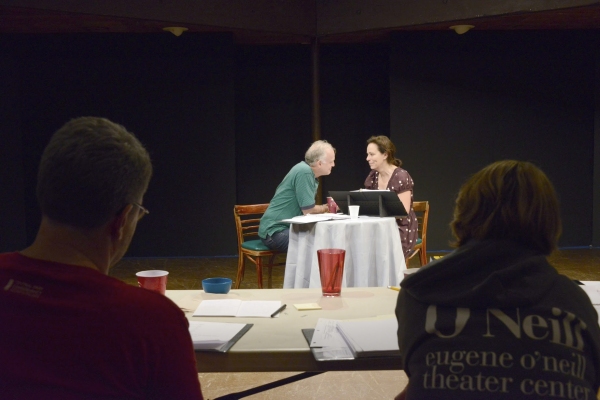Exclusive: Reed Birney & Jane Kaczmarek Return to O'Neill's Playwrights Conference in Wendy MacLeod's SLOW FOOD - Photos and Q&A!
Staged readings for the 2015 National Playwrights Conference began earlier this summer at the Eugene O'Neill Theater Center. Under leadership from Artistic Director Wendy C. Goldberg in her 11th season, the famed conference developed eight new plays, selected from a pool of 1,300 submissions, with support from an award-winning slate of actors and directors.
Rounding out the season was Wendy MacLeod's new play SLOW FOOD, featuring three-time Golden Globe and seven-time Emmy Award nominee Jane Kaczmarek, Tony Award-winning and Olivier Award-winning Michael Beresse, and Broadway veteran and Tony nominee Reed Birney.
In honor of the star-studded development, BroadwayWorld brings you an exclusive look at the cast onstage and in rehearsal, as well as comprehensive Q&A with SLOW FOOD's company!
Check it all out out below!
What was the first project you worked on at the O'Neill?
Wendy: [In 1986], when I was still a student at Yale Drama School, I worked on a television adaptation of THE LOST COLONY during the O'Neill's New Drama for Television Project.
Reed: The first play I did was in 1984, MITZI'S GLORY by Carl Capatorto. I acted with Ben Siegel. I think they lost an actor at the last minute and held auditions for it. It was about two drag queens. I wouldn't play another character in drag for another 30 years, when I did CASA VALENTINA!
Michael: [TITLE OF SHOW] in 2005. I will never EVER forget the first evening we sat working under those magnificent copper beech trees on the front lawn feeling like we had gone to creative theatre camp heaven.
Jane: The first production I worked on was in 1989, a play called THE MUD PEOPLE by Keith Huff. I remember playing a character role with my glasses on and curlers in my hair. Parts like that are fun because you can really throw yourself into them-especially since you're still carrying the script.
How is this summer different?
Wendy: I used to be the protege and now I'm the grizzled veteran.
Reed: I played all the sons when I first came to the O'Neill. Now I'm all the fathers. The physical plant of the O'Neill is virtually the same and the experience of working on the plays is too. There are just so many ghosts here now.
Michael: Although I've been back to the O'Neill as both a director [NOW. HERE. THIS.] and a teacher [with the National Theater Institute], this is my very first time here as an actor! Wahoo!
What keeps you coming back to the O'Neill?
Michael: I suppose it's what keeps everyone coming back, the feeling that you are truly safe. Safe to experiment and risk and fail and actually be in the process of making things, not just overwhelmed with the expectation of result.
Reed: A great part of the appeal is the history I have with the place. But it is Actor Camp at its best. A beautiful location, wonderful, passionate people and it's heartening to see so many kids all hopped up like we were once upon a time.
Wendy: A summer at the O'Neill will sustain you through the many years you will spend working alone in a room. You get an unbelievably high caliber of actors, directors, and dramaturgs here, and a tremendous sense of community. And it all takes place in an unbelievably beautiful place, where playwrights are treated like rock stars. I love getting to know other playwrights--the people who used to be the competition turn into your friends and advocates.
How did the play progress in one week?
Wendy: We made important trims, sharpened the jokes and moved things around to make more emotional sense. Between the first and second performances, we even changed the ending! I feel like it's getting really close to being done.
Michael: It depends on how you view it. For Wendy (the playwright), there were actually very few text changes, most of them minor adjustments for story clarity. The greater challenge for Kent Nicholson (the director) and all of us was to find the tone and pace that would really let the characters and the story bloom. In that respect, we came light years! It's a deceptively challenging play that toes the line between realism and absurdism and until we had an audience we really couldn't fully ride the ride. Happily, it turns out to be one helluva ride.
Have you worked with any of this team before?
Michael: Not a single person. That said, I've known them a week and I feel like we all grew up on the same block and could easily have been arrested together. I mean that in the most complimentary way.
Reed: Jane Kaczmarek and I were here together in 1989 but we never did a play together then. Michael Berresse is, of course, a super-star in the musical theater world, but they really are such parallel universes, I had never met him before. It's been a fantastic time working together.
Jane: I met Reed Birney my first summer at the O'Neill, and here we are again 25 years later. And what a reunion! I told Wendy MacLeod she is going to retire on this play, SLOW FOOD. Audiences love it and it's a blast for the three actors on stage.
Wendy: They were all new to me, but I will move heaven and earth to work with them again.
What is most interesting about your character in SLOW FOOD?
Reed: He is a bag of contradictions, gruff and sentimental, and talking about some really difficult things in the middle of a farce. It's been a wonderful challenge to meld that all together.
Michael: Two answers: For the actor in me, it's a fascinating and mildly terrifying journey into the mind of a narcissistic, passive aggressive, wildly insecure but strangely charming nightmare of a waiter. Actually, now that I think about it, it's pretty much the same for the audience.
What was the funniest moment during the workshop?
Wendy: When we rehearsed the curtain call, we reminded the actors to acknowledge the seats in the balcony, where the interns usually sit. Reed Birney ironically opened his arms wide to the imaginary aspirants, and said "Get out while you can!"
Reed: I think when we did our first presentation and the audience went wild for the play! We were not prepared for the crazy laughter and I could feel us all blown back and wanting to stop and check in with each other- "Are you seeing what I'm seeing?!!!"
Michael: Trying to stare both Reed Birney and Jane Kaczmarek in the face and not laugh at their hilarious takes. In fact, I failed quite miserably on a number of occasions.
Jane: The funniest moment in rehearsal, for some reason, was the line " "DIMITRI IS DAMAGED ?". Michael, to whom I said the line, would just crack up. I said it very seriously, with a straight face, and Michael couldn't even make eye contact with me. I adore him. We became fast friends and I can't wait to work with him again. Hell, I can't wait to have LUNCH with him again!
What do you like about developing new plays vs. full production?
Wendy: I like that changes are expected and can be so nimbly made. Actors haven't memorized their lines so all they have to do is cross something out on a page, or get handed new pages. In a full production, making changes can be like turning an ocean liner around.
Michael: The terror. No really! The terror and the undeniable 'aliveness' of flying by the seat of your pants as you find things for the first time. Also the satisfaction of knowing you are truly helping to build the ship, not just sail it.
Jane: Rehearsing new plays is a perfect antidote to working on TV and films. Your skills of listening, imagination, collaboration are on high alert. No one has a sure idea of what will unfold. It's like tapping one of those geode rocks. By the end of the week you discover the crystals inside, and then when the audience arrives, it's a moment of pride and (exhaustion) to celebrate the teamwork that's aided the playwright in honing the characters and narrative she wrought. Can't wait for next summer.
Reed: There's a freedom that these crazy staged readings have, a spontaneity that fully staged productions can't have. And, honestly, even staged readings other places don't have it. There's something magical about what happens at the O'Neill.
Do you have any of your own funny dinner-date stories?
Jane: When I came to Los Angeles in the summer of 1982 I had a dinner date. He came to pick me up and asked where I wanted to eat. I had no idea, being brand new to town. When he suggested a "Tie restaurant", I stammered for awhile not knowing what he meant, and finally said "No, I don't want to have to put on nylons and get all dressed up." Now it was his turn to stammer. He said, "What? I mean Thai food like from Thailand...." I had never heard of Thai food before, much less a Thai restaurant. I thought "Tie restaurant" was a euphemism for a dress-up restaurant where men wore (neck)ties and women wore nylons. Brave new world.....
Wendy: The play was inspired by a particular waiter at a particular Greek restaurant in Palm Springs, where we went on the first night of a family vacation. We had lots of fun during rehearsals looking up the Yelp reviews that mentioned this very strange waiter...
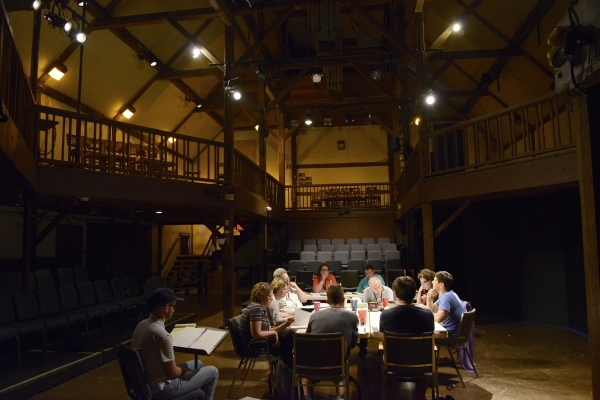
Company
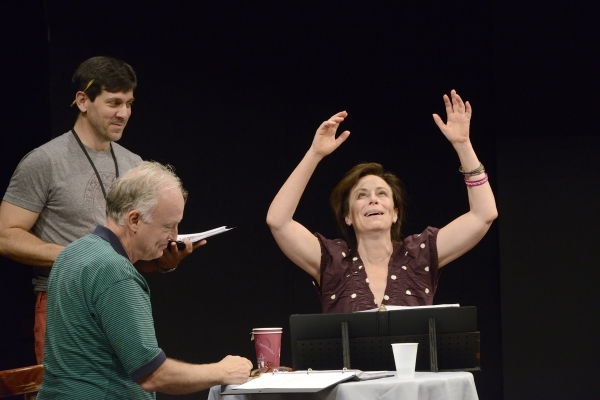
Reed Birney, Jane Kaczmarek, Michael Berresse
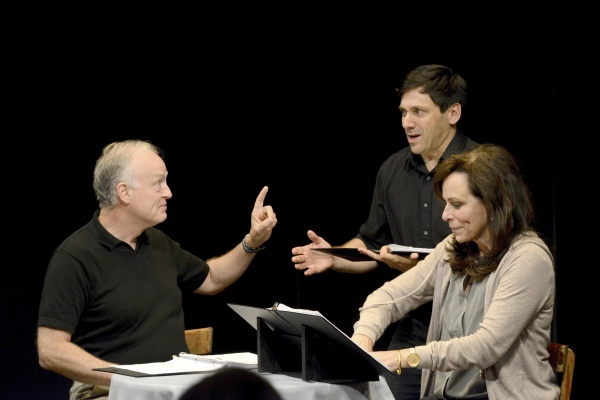
Reed Birney, Jane Kaczmarek, Michael Berresse
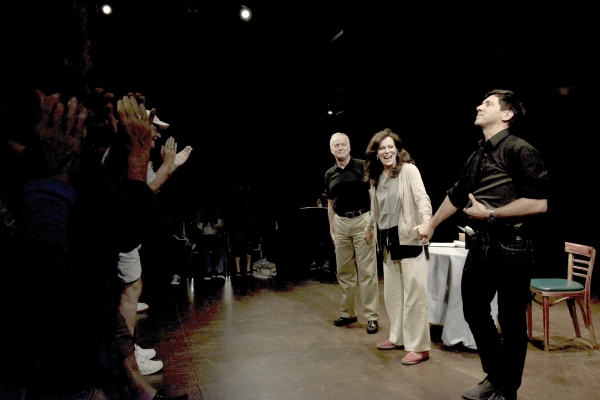
Reed Birney, Jane Kaczmarek, Michael Berresse
kaczmarek,mcleod,birney,andberresseatbluegene'spubattheeugeneo'neilltheatercenter,followingaperformanceofmacleod'snewplayslowfood.photocredita.vincentscarano.jpg)
Jane Kaczmarek, Wendy MacLeod, Reed Birney, Michael Berresse
Videos
.png)
